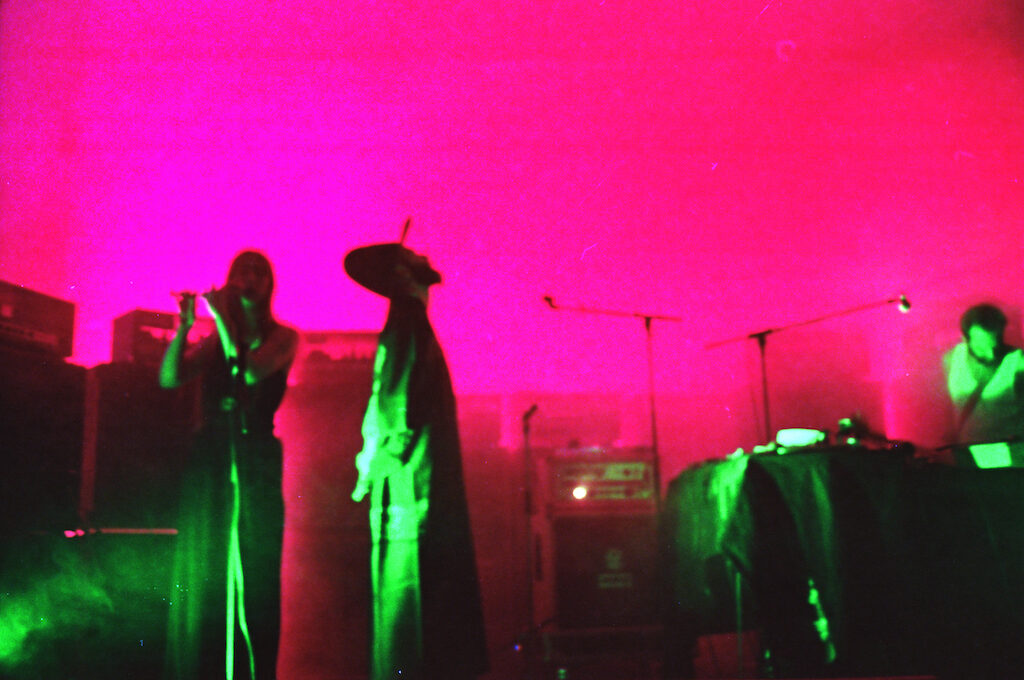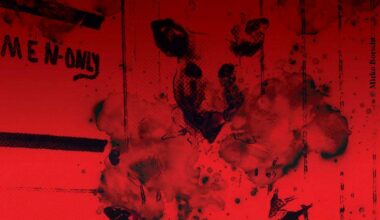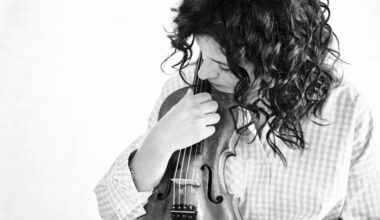Shaddah Tuum is the longtime collaboration of Berlin based artists Niko de Paula Lefort and Brandon Rosenbluth.
From The Wheel, Shaddah Tuum’s debut LP, emerges a path of transformation and transfiguration of the self – where identity splits into quantum particles, inwardly spiraling invocations of time, desire, power, and myth – towards a transcendent awakening. The album departs from the noise techno endeavours of their 2014 EP, building upon tentacular influences from diverse ethnomusicological sources and mystical readings. The Wheel is a monstrous sonic creature, kin to our collective cyborg-spiritual becoming.
The overall structure of Shaddah Tuum’s LP echoes progressive states of metaphysical change while its title refers to the Buddhist/Hindu concept of life in the karmic cycle of Samsara, as well as the tenth arcana of the tarot deck, the Wheel Of Fortune: the frozen frame of time-space awaiting the slightest trigger to pursue its path of flowing mutations. Diffracted by Kabbalistic and Buddhist scriptures, the lyrics are inspired by media philosopher Vilém Flusser’s The History of the Devil. Flusser’s book invokes the seven deadly sins as a lens for the dissection and disillusionment of Western socio-cultural constructs.
FACTS
1. The admittance of mystery has been the central truth of the world, rather than this desire for mastery. – James Bridle
2. The transcendent knowledge of the mystic cannot be expressed in language. – Ursula K. LeGuin
3. Nothing is true; everything is permitted. – Hassan-i- Sabbah
QUESTIONS
1. What is the biggest inspiration for your music?
Brandon: COIL and their affiliated offshoots Cyclobe and The Threshold HouseBoys Choir alongside Dead Can Dance and Catherine Christer Hennix would be primary inspirations for me. We are both very moved by Indian classical music, in particular Dhrupad, and have studied the singing style and tuning system with a teacher in Berlin after recording our album.
Niko: The myriad vibrational relations between self, community, the places we live in, the far and the beyond. How people, animals, plants, objects interact through vibration, sound, resonance and listening. That thing called aurality. Within aurality, Shaddah Tuum is very much influenced by what Vilém Flusser called “magical-mythical” relational modes. Most of our material emerges from spiritual experiences, listenings and readings, distilled into improvisations later rather intuitively edited.
2. How and when did you get into making music?
Brandon: I began learning percussion at the age of 6 and played drums in jazz, concert, and marching bands in school although my main passions were punk and metal growing up. When I had the incredible opportunity to attend CalArts Summer program for high school students I was introduced to avant garde musical practices by Pauline Oliveros and first got into electronic music from Warp and Ninja Tune artists and learned to use Reason. I subsequently had the privilege to study with Maryanne Amacher at Bard College.
Niko: The first three days of my life, I didn’t open my eyes. I was listening. Some years later, I found myself in a band called reliq with Brandon, in which I played processed guitar mostly and did most of the production of samples for live and recordings. At some point I shared with him my desire to work on an electronic music production. We were enjoying much of the noise-techno scene at that time, Samuel Kerridge, Emptyset, FIS, Shackelton… Shaddah Tuum was born out of that impulse.
3. What are 5 of your favourite albums of all time?
Brandon:
The Velvet Underground & Nico – S/T
Blonde Redhead – Misery Is A Butterfly
The Knife – Shaking The Habitual
Coil – Moon’s Milk (in Four Phases)
Dead Can Dance – Into The Labyrinth
Niko:
Super Onze de Gao – Enregistrés pour Yehia Le Marabout
Suzanne Cianni – Buchla Concerts 1975
Bernard Parmegiani – De Natura Sonorum
John Coltrane – A Love Supreme
Keiji Haino – “C’est parfait” Endoctriné tu tombes la tête la première n’essayant pas de comprendre quelque chose si tu te prépare à accepter tout compris / Entre en toi-même cela se résoudra
4. What do you associate with Berlin?
Brandon: Cycling across the vast vista of Tempelhof, beers in the park, long nights out and sunrise journeys home.
Niko: The many lives lived intensely, the desire of a quieter one. Shaddah Tuum (as reliq) is related to a darker phase my life. I guess Berlin allowed that and maybe still does, getting in touch with deeper, darker corner of the self.
5. What’s your favourite place in your town?
Brandon: I recently relocated from Berlin to Ljubljana and enjoy taking long walks in Zale cemetery.
Niko: Where I stand now.
6. If there was no music in the world, what would you do instead?
Brandon: I’d make art and study world religions.
Niko: Nothing, in silence.
7. What was the last record/music you bought?
Brandon: Crystallise, A Frozen Eye by James Ginzburg
Niko: Jéricho – De Droit Nien
8. Who would you most like to collaborate with?
Brandon: Artists working with non-musical media in a trans-disciplinary narrative modality and engaged in the latest developments in machine learning and cyborg performance technologies which interact with invisible energies and non-human entities.
Niko: If there was unlimited time – with many artists on the local scene, collectives and individuals in South East Asia, Brazil, Occitania, West and North Africa, mostly, and further with other-than-human species, and various acoustic ecologies, birds, insects, micro organisms, particles, specific ecological niches.
9. What was your best gig (as performer or spectator)?
Brandon: As a performer, opening for Sunn O))) at Heimathafen in 2015. As a spectator, Dead Can Dance at Tempodrom in 2019 was the last gig which left me speechless.
Niko: Yes, opening for Sunn O))) with Brandon (and reliq ex-bandmate Carolin Langner as guest) was a grand moment in Shaddah Tuum’s history. The gig that opened up my desire to produce electronic music was Monolake at a SUB:STANCE event in Berghain.
10. How important is technology to your creative process?
Brandon: Our musical ideas are inspired by our instruments and our instruments channel our ideas in a generative symbiosis. Our instruments are as much our own bodies as our modular synths and acoustic sound generators, all of which employ technique and are technology.
Niko: We are all cybernetic beings, I guess? As Brandon puts it, there is a generative symbiosis, a processual dialogue or a collaboration in a way. In the end what matters is how it sounds, a balance of materiality and cosmology that impregnates the listeners.
11. Do you have siblings and how do they feel about your career/art?
Brandon: I have a younger sister – we were born in the same year in fact. I don’t think she can connect with my music, but appreciates that I’m active making it and performing it around the world.
Niko: My siblings are quite supportive though experimental music is relatively out of their scope (so they think!).
Photo © Viviana Druga


